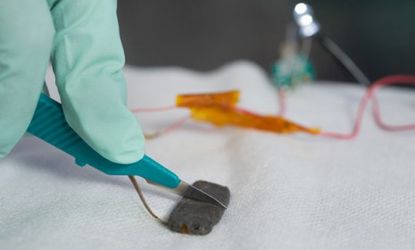Breakthrough: Self-healing electronic skin that's sensitive to the touch
Imagine responsive prosthetics that can feel and heal. Researchers believe they're one step closer to realizing that elusive goal

A team of Stanford chemists and engineers have pioneered a new kind of plastic skin that might one day make it possible for us to build prosthetics that not only recreate the sensation of touch, but can patch themselves up after being damaged — just like real human flesh. Developing this new e-skin, as reported this week in the journal Nature Nanotechnology, required researchers to first create a self-healing material that could also conduct electricity. To accomplish this, says Elizabeth Armstrong Moore at CNET, they started with a plastic polymer composed of "long chains of molecules linked up via hydrogen bonds" — imagine a flexible plastic that feels like saltwater taffy — that really can heal itself. But what makes the plastic skin truly incredible is the rate at which it heals. Kelly Servick at Stanford News explains:
The researchers took a thin strip of the material and cut it in half with a scalpel. After gently pressing the pieces together for a few seconds, the researchers found the material gained back 75 percent of its original strength and electrical conductivity. The material was restored close to 100 percent in about 30 minutes.
Researchers also combined the plastic polymer with tiny particles of a nickel polymer to increase the e-skin's strength and electrical conductivity. It's this electrical circuitry that allows the plastic skin to be so sensitive that it can detect minute differences in the pressure of a handshake. The hope is that one day this electrical conductivity will be able to communicate touch to some sort of central nervous system.
Subscribe to The Week
Escape your echo chamber. Get the facts behind the news, plus analysis from multiple perspectives.

Sign up for The Week's Free Newsletters
From our morning news briefing to a weekly Good News Newsletter, get the best of The Week delivered directly to your inbox.
From our morning news briefing to a weekly Good News Newsletter, get the best of The Week delivered directly to your inbox.
The technology also possesses "cyborg potential beyond its application in prosthetics," says Natasha Lenard at Salon: Imagine electronics that heal themselves in minutes, or wires that can self-attach after being severed. In other words, feel free to drop your iPhone 12 as many times as you please.
Sign up for Today's Best Articles in your inbox
A free daily email with the biggest news stories of the day – and the best features from TheWeek.com
Create an account with the same email registered to your subscription to unlock access.
-
 5 sleeper hit cartoons about Trump's struggles to stay awake in court
5 sleeper hit cartoons about Trump's struggles to stay awake in courtCartoons Artists take on courtroom tranquility, war on wokeness, and more
By The Week US Published
-
 The true story of Feud: Capote vs. The Swans
The true story of Feud: Capote vs. The SwansIn depth The writer's fall from grace with his high-flying socialite friends in 1960s Manhattan is captured in a new Disney+ series
By Adrienne Wyper, The Week UK Published
-
 Scottie Scheffler: victory for the 'pre-eminent golfer of this era'
Scottie Scheffler: victory for the 'pre-eminent golfer of this era'Why Everyone's Talking About Masters victory is Scheffler's second in three years
By The Week Staff Published